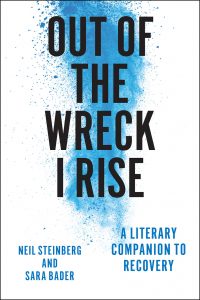John Williams for the New York Times on Out of the Wreck I Rise

Out of the Wreck I Rise, edited by Neil Steinberg and Sara Bader, positions itself, as its subtitle indicates, “A Literary Companion to Recovery.” The poetics of recovery isn’t really a field (and, if we’re going by Aristotle, poetics is a system, not a discipline), but this volume comes close to illuminating a relationship between creativity and the drive to reclaim possession of one’s life. This past week, John Williams previewed the anthology for the New York Times Book Review, and coeditor Neil Steinberg posted a playlist at Largehearted Boy for some ambient inspiration that “speaks to what the book is about.”
From the September 2, 2016, issue of the New York Times Book Review:
“Alcoholics Anonymous,” commonly referred to as the Big Book, helped to establish the 12-step program. It’s been an indispensable guide for millions since it was published in 1939. A new, very different kind of book, “Out of the Wreck I Rise: A Literary Companion to Recovery,” by Neil Steinberg and Sara Bader, aims to be a complementary comfort.
An anthology of excerpts about addiction and recovery, the book includes many names you’d expect to see on the subject: John Cheever, John Berryman, Raymond Carver. Maybe you wouldn’t expect to see Plato, who asked in “The Republic,” “Shall we say that there are times when thirsty people are not willing to drink,” and “the preventing part comes into play as a result of reasoning, whereas the impulses that lead and drag him are due to emotive states and diseases?”
The selections are laid out in an arc that reflects the arduous process, in chapters with subtitles like “The End of the Party,” “Making the Leap” and “Early Recovery.” There’s humor alongside some of the wisdom. Keith Richards is quoted: “A cure imposed by the authorities lacks conviction in the heart.”
But many of the contents are expectedly harrowing, like Charles Jackson’s description of craving in “The Lost Weekend,” his novel that was later turned into a film that won the Oscar for best picture in 1946. “As for quenching his thirst, liquor did exactly the opposite,” Jackson wrote. “To quench is to slake or to satisfy, to give you enough. Liquor couldn’t do that. One drink led inevitably to the next, more demanded more. . . . His need to breathe was not more urgent.”
To read more about Out of the Wreck I Rise, click here.